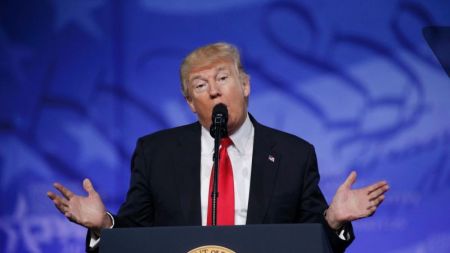Donald Trump Amps Up War on 'Fake News,' Says Reporters Shouldn't Use Unnamed Sources

Just hours after blasting national security "leakers" for giving classified information to the media on Twitter, President Donald Trump amped up his campaign against "fake news" and raged against the use of unnamed sources in a speech at the Conservative Political Action Conference Friday.
"The FBI is totally unable to stop the national security 'leakers' that have permeated our government for a long time. They can't even find the leakers within the FBI itself. Classified information is being given to media that could have a devastating effect on U.S. FIND NOW," Trump tweeted ahead of his CPAC speech Friday morning.
Minutes after he hit the stage at the conservative gathering where he was greeted with friendly chants and a standing ovation, Trump quickly made it clear that he was at war with "dishonest media."
"I want you all to know that we are fighting the fake news. It's phony, fake. A few days ago I called the fake news the enemy of the people and they are. They are the enemy of the people because they have no sources, they just make them up when there are none," Trump said.
Without specifying the publication by name, Trump then obliquely referenced a report in The Washington Post on his former national security adviser Michael Flynn's conversations with a Russian ambassador.
"I saw one story recently where they said nine people have confirmed. There are no nine people. I don't believe there was one or two people, nine people and I said give me a break, 'cause I know the people," said Trump.
"I know who they talk to. There were no nine people but they say nine people. And somebody reads it they say 'oh nine people, they have nine sources.' They make up sources. They are very dishonest people," he added.
Post Executive Editor Marty Baron quickly pushed back the president in a statement Friday in which he stood by the reporting.
"Everything we published regarding Gen. Flynn was true, as confirmed by subsequent events and on-the-record statements from administration officials themselves," Baron said. "The story led directly to the general's dismissal as national security adviser. Calling press reports fake doesn't make them so."
Trump went on to explain that he isn't against the press but wants the media to report fairly. He also explained why he believes media should not be able to use unnamed sources.
"I'm not against the media, I'm not against the press. I don't mind bad stories if I deserve 'em. And I tell you, I love good stories ... I am only against the fake news media or press. Fake. You have to leave that word. I'm against the people that make up stories and make up sources. They shouldn't be allowed to use sources unless they use somebody's name. Let their name be put out there. Let their name be put out," said Trump.
He explained that dishonest media results in a "false narrative" and urged his supporters at the conference to join him in the war on "fake news."
"And we have to fight it folks. We have to fight it. They are very smart, they are very cunning and they're very dishonest," he said.
"It's a very sensitive topic and they get upset when we expose their false stories. They say that we can't criticize their dishonest coverage because of the First Amendment. They always bring up the First Amendment. And I love the First Amendment, nobody loves it better than me. Nobody. Who uses it more than I do?" he asked.
"But the First Amendment gives us the right to speak our minds freely. It gives you the right and me the right to criticize fake news and criticize it strongly. And many of these groups are part of the large media corporations that have their own agenda and it's not your agenda and it's not the country's agenda. It's their own agenda," he said.
"They have a professional obligation as members of the press to report honestly but as you saw throughout the entire campaign and even now, the fake news doesn't tell the truth," the president added.
In 2013, the Obama Justice Department investigated Fox News reporter James Rosen as a "co-conspirator" in a case involving the leaking of classified information after he refused to reveal his unnamed sources. Much of the media defended Rosen at the time.
"With the decision to label a Fox News television reporter a possible 'co-conspirator' in a criminal investigation of a news leak, the Obama administration has moved beyond protecting government secrets to threatening fundamental freedoms of the press to gather news," The New York Times editorial board wrote at the time.





















